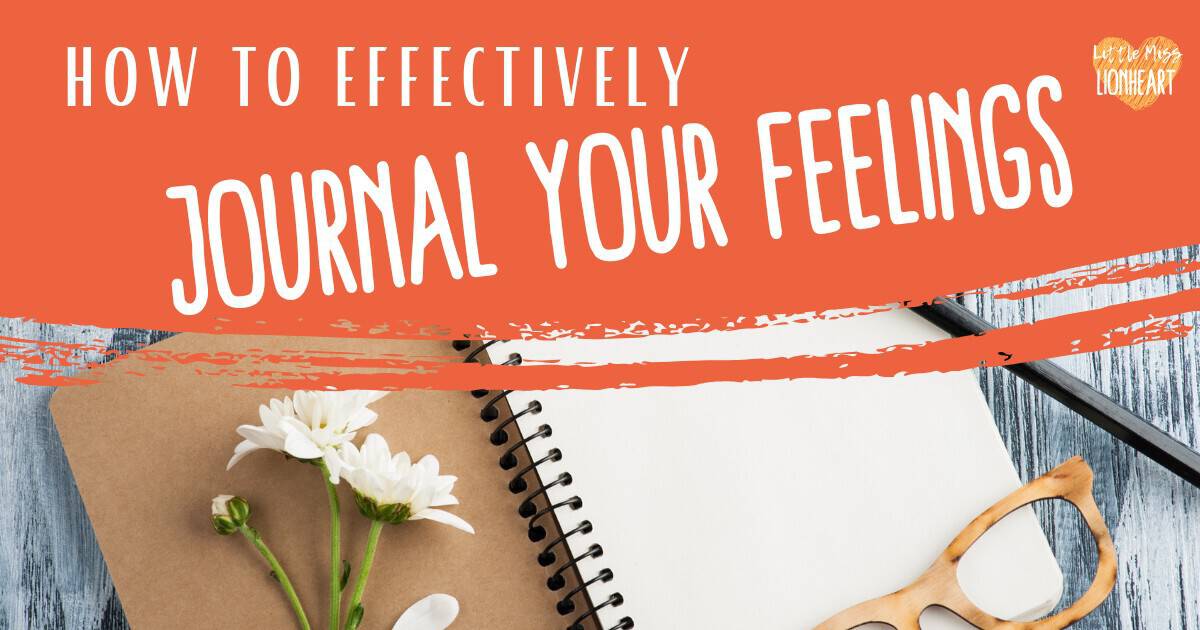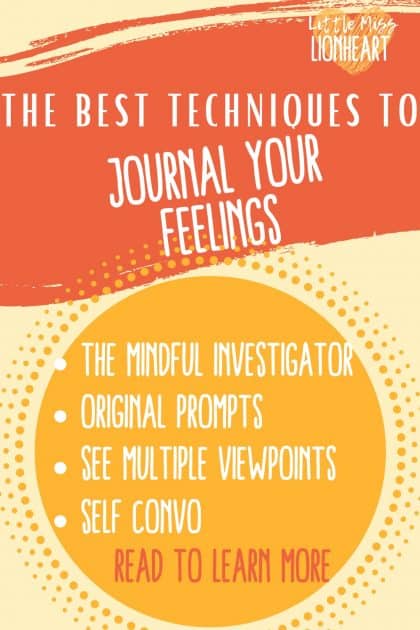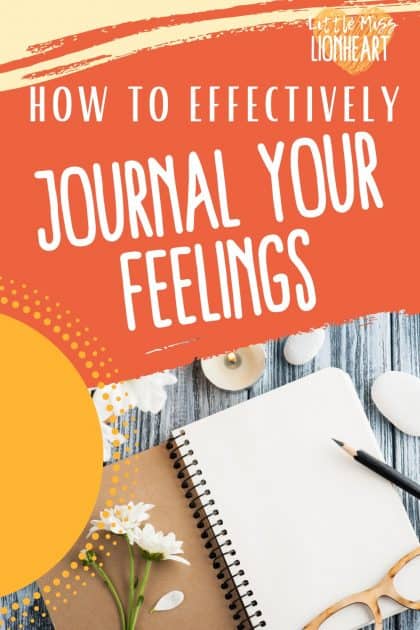
We’ve come to the final episode in our 3 part series on how to journal in a way that heals. I hope you’ve enjoyed it so far! This post is my favorite because it contains my all time favorite strategy for how to journal your feelings. These expressive writing ideas are all pretty great in their own right, but there’s one that I prefer above all others.
I’m calling these the advanced strategies for journaling, in large part because many of them really require that you have mastered the mindset shifts that were introduced in first post.
Related: The Mindset You Need for How to Journal Effectively

Be a Mindful Investigator
So this one is partially about a mindset shift and partially a more practical expressive writing technique. To start, this one requires you to practice some mindful skills in relation to your experience.
▶Start by sitting with the feelings and trying to simply observe them.
It’s really important here not to get caught up in judging yourself for the emotion or getting stuck on how horrible they are.
Your goal is to simply observe the feelings the way one observes the shape of clouds. Pay particular attention to things you haven’t noticed before rather than simply rehashing what you have previously noticed about your emotion.
Related: The 5 Best Self Care Gifts I’ve Ever Given Myself
▶Next, we shift into the investigator.
You might start by asking “does this experience remind me of any other times in my life?” or “Where did I learn this response to this kind of situation in my life?”
Here, we are looking for times in the past where we may have experienced something painful that created the response pattern we are experiencing in the present.
▶Pick Your expressive writing technique
Once you’ve identified something, there are several ways to effectively journal your feelings, remembering the mindset shifts of using self compassion and caring curiosity. Several of the options already listed would work well here, but here’s a new one for you:
Expressive Writing Prompt to Journal Your Feelings:
Write a letter to your younger self who was hurt in that situation. Write to her as if you were the parent she needed in that moment. Validate and encourage that younger you. Help her “unlearn” some of the painful beliefs she may have internalized from that experience.
It would be too long to give you a letter I wrote to myself but I’ll give you an example of the mindful investigator:
As i was thinking about this situation just now, I was reflecting on how horrible and overwhelming it feels to even accidentally or unintentionally hurt another person or to even be part of something that led to them getting hurt. It feels so incredibly overwhelming, anxiety producing, shaming etc…
As I thought about it more, it naturally led me to a painful situation with a friend in high school. That is the most related example of a time when I, by complete accident, hurt someone in a really big way. It still upsets me to think about that event.
Original Prompts for Journaling Your Feelings
If you want to use prompts to think through your experience more and are reasonably able to use curiosity and self compassion, I have found some of these expressive writing prompts helpful.
I’ve included some of the answers I have given to these prompts to help put the questions in a better context:
▶Why might some part of me believe that I need this anxiety/depression/challenge?
Because if I’m not anxious about what everyone thinks of me and every interaction, I’ll end up never having friends. No one will want to be around me if I set boundaries or take care of myself. I’ll end up alone.
▶Who might it hurt if I were to overcome this issue?
I might not have friends if I become more assertive. They might not like me if I’m not the ‘Nice girl without a mean bone in her body.’
▶Are there any ways in which this issue makes me feel more powerful?
Not more powerful but being conflict avoidant and anxious sometimes means that people take care of me and that feels really nice.
▶Does it feel like me letting go of this is the same as me forgiving someone or forgetting?
Not really, though being passive does feel like it’s part of the mountain roots I inherited and sometimes feels “disloyal to my people” to be assertive, weirdly.
▶What would I lose without this story, if this were no longer true?
Feeling cared about when someone else stands up for me. Though, I guess I’d also be losing people thinking I’m weak because I need it. Pro and Con all in one.
▶What does it feel like I need to do to resolve this problem and are there any downsides to that?
Maybe learn to care more for myself? Downside is I worry about becoming self absorbed if I focus on caring for myself. I know, I know that’s a logical fallacy. Or can be, anyway.
Take Away From Expressive Writing Prompts to Journal Your Feelings:
The point of these questions is to help you think about why some part of you might have reservations about letting go of an issue.
It’s really important here not to fall into judging or shaming yourself for the answers you come up with. Just let them be, recognize that the human mind is complex, and know if people are really honest with themselves, they’d have similarly uncomfortable answers for their own challenges.
It might feel uncomfortable, but it’s important to recognize the common humanity of your answers which counters shame.
Explore other viewpoints to Journal Your Feelings
There are a few ways this can be done. Some people are naturally good at looking for all sides of an issue and it’s easy for them to explore the way they interpreted something and then look for other possible interpretations. If this is you, have at it.
If that’s not strong for you and you struggle to move past the way your brain interpreted a situation in the moment, that’s ok. There are some techniques that can help guide you.
Related: Actually, Sometimes Stress is GOOD for You
▶Take the ‘fly on the wall’ approach.
To do this, imagine that you are a fly on the wall observing the exact same situation you just experienced. Then write about the differences that the unbiased fly would notice.
If you have a hard time finding this objectivity, it can be helpful in your mind’s eye to imagine someone playing you. This helps to further remove the personal bias we naturally tend toward and can help with that objective view.
▶Pick someone in your life who is very different than you and imagine how they would interpret the situation.
Or even call that person and tell them about the situation and ask them how they see it, then journal about the difference in perspective.
I tend to be the person more inclined toward identifying other perspectives more naturally, though I have still found the two techniques above helpful. If you read my post about getting caught up in the parade, you saw an example of that. Here is a clip of my journal showing me exploring different points of view.
I think there is a line that I need to find…
A line of being conscientious about caring for people and being gentle, not adding to their pain…and taking responsibility for their reactions, interpretations, etc…
I’m not comfortable not caring how they will react at all because I could use that justification to treat people however I wish and that doesn’t work for me.
But I also can’t take responsibility when I’m being gentle, conscientious, and respectful of the person’s dignity and they still have a challenging reaction. Maybe it’s not one or the other, but rather both.
Responsible to people but not for people. Responsible to offer care, support, dignity, respect, honesty, authenticity, gentleness. Not responsible for them, their actions, their reactions, thoughts, etc…
Past that, the question becomes in each interaction how do I balance honesty with respecting someone’s dignity, being gentle with being authentic. Also, being comfortable doing what is best for someone and not what is easiest on them.
Related: 15 Rules for Self Worth that Every Woman Should Live by
Journal a Conversation Between You and You.
My appalachian roots are about to come out here…That caption is as clear as mud, right? Let me explain…
One of the most effective expressive writing exercises that I discovered in how to journal my feelings was conversing between different parts of myself.
When I faced a situation that hurt me or made me angry and scared, it felt like I was a kid again. So I will allow myself some space to feel the emotion. Then I will respond with my healthiest adult self, or the nurturer inside.
So, for me that literally looked like this:
▶Emotional “kid” side:
I just wish I could fix it. I wish I could keep him from the nightmares and flashbacks. That I could keep him from the pain and fear. I wish so desperately that I could hold all of this suffering away from him. Even if I had to be the barrier that took the pain for them. I just wish I could protect them.
▶Validating “adult” side:
It hurts you to your core to see people that you love suffer. The goodness and light inside of you aches at the hurt they experience and it rocks you. As painful as it is, allow yourself to be with that feeling. That feeling is love. It’s courage.
That feeling is goodness. It is light and life that suffers at the darkness in the world. It suffers because it is good and because as goodness, it hurts when it encounters pain. That feeling is valid. You are valid. It is allowed to be here and so are you.
This is a clip of my journal. I ended this exercise noting that even though the pain I was feeling was still present, I noticed that it felt more bearable after the exercise. This exercise really requires the mindset shifts we’ve talked about in the first episode, so make sure you’ve got those down.
Yes, you guessed it! This one is, by far, my favorite expressive writing strategy I have used for jouraling my feelings. I found this strategy so very helpful in managing a very overwhelming life event and all of the emotions that came with it. I can’t recommend it enough. Definitely try it out and let me know how it goes.

Connect with Me
Want a few extra strategies? Make sure you check out the second post in this journaling your feelings series for a few additional strategies!
You’ll find it here: The best techniques for keeping an emotion journal
I hope you’ve enjoyed this three part series on how to journal your feelings with my out of the box expressive writing ideas. What have you tried and liked? Have you struggled with any of these? Drop me a comment below!
This was a good read! It is hard to start journaling, but a format helps a lot!
Thanks for sharing! How often do you journal?